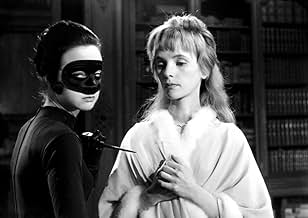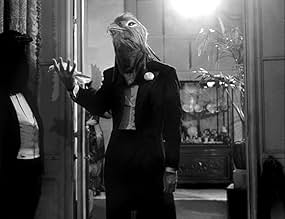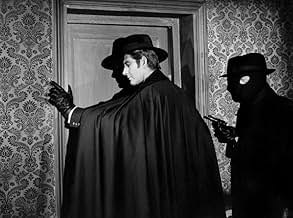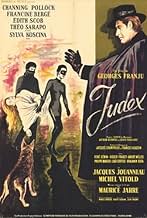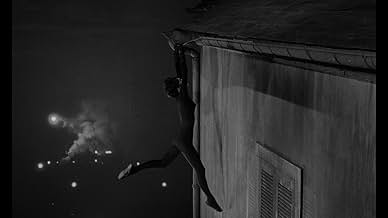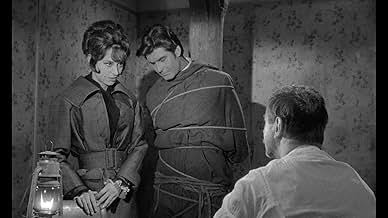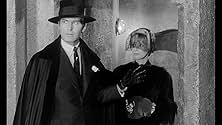AVALIAÇÃO DA IMDb
7,0/10
3,1 mil
SUA AVALIAÇÃO
Adicionar um enredo no seu idiomaAfter abducting a corrupt banker to make him pay back the people he swindled, a conjuring vigilante must rescue the man's daughter when she is kidnapped by the scheming family governess.After abducting a corrupt banker to make him pay back the people he swindled, a conjuring vigilante must rescue the man's daughter when she is kidnapped by the scheming family governess.After abducting a corrupt banker to make him pay back the people he swindled, a conjuring vigilante must rescue the man's daughter when she is kidnapped by the scheming family governess.
- Direção
- Roteiristas
- Artistas
Avaliações em destaque
Louis Feuillade, one of the true pioneers of cinema whose work has undeniably influenced Lang and Hitchcock, had been criticised for glorifying villainy in his hugely popular serials 'Fantomas' and 'Les Vampires'. He redressed the balance somewhat by creating Judex, a hero who is both judge and jury.
Director Georges Franju has managed here to reduce the original 5 hour, 12 episode original to just 97 minutes which is no mean feat although unavoidably, compromises have had to be made.
Some have confessed to being baffled by the twists and turns of the admittedly condensed plot but their bafflement quite frankly baffles me as the film is sufficiently well-constructed and the pace certainly slow enough not to cause confusion.
Feuillade's work is known for its anarchy and surrealism. This adaptation has little anarchy and its surrealism is mixed with realism. This is Lunacy restrained. Essentially a film of moments, or 'set pieces' if you like, Franju's unique visual style and sense of atmosphere make it mesmerising to watch.
Behind every great fortune there is usually a great crime and banker Favraux, played superbly by Michel Vitold, has enriched himself by the Panama Scandal. He is called to account for his crime in an anonymous letter which threatens death at midnight if he does not atone and return to his victims his ill-gotten gains. He chooses to ignore this warning and at the stroke of midnight at a masked ball he appears to drop dead, only to awaken in an old castle to find himself the prisoner of a mysterious figure in a cloak and a slouch hat.............
Judex is here played by Channing Pollock, a handsome hunk who made a few European costume films at this time. He began as a magician and in this is able to perform his famous 'dove act'. As an actor alas, he is a plank.
Franju regular Edith Scob as the banker's daughter is required to do little more than play a Miss Goody Two Shoes but the camera loves her will o' the wisp persona.
Saints are not nearly as interesting as sinners of course and by far the most fascinating character is that of Diana di Monti. As a ruthless, sensual and utterly deranged villainess she is a gift to any actress and is here played with relish and aplomb by Francine Berge, complete with catsuit and nun's habit, wielding a dagger and a hypodermic needle. Her choreographed fight on the rooftop with luscious Sylva Koscina as Daisy the circus performer is guaranteed to quicken the pulse. Franju is reported to have said of Daisy's character: "I could have done without her" but happily for us he couldn't!
Jacques Jouanneau does a good turn as the incompetent detective Cocantin and there is a captivating performance by Benjamin Boda as Reglisse the boy. Also of interest is a brief appearance as a doctor by Andre Melies, son of that other pioneer director, Georges.
Mention must be made of Robert Giordani's superlative art direction, Marcel Fradetal's magnificent cinematography and Maurice Jarre's atmospheric score.
Whatever its weaknesses this bizarre opus is immensely entertaining and can be revisited with pleasure. Ideally one could have done with a little more flamboyance but that after all, is simply not Franju's way.
Franju's evocation of a lost innocent era of French silent cinema is a real gem, and a much neglected film. The film creates an air of gentle menace from the opening scenes featuring a bird-masked magician at a masked ball. We soon learn that he is, in fact, Judex, the legendary crime-fighter. He soon becomes engaged in a battle with a cat-suited female criminal. The plot itself is one-dimensional comic-strip stuff, as the above suggests, but what constantly impresses is the poetic set-pieces Franju sets up, particularly a burglary at a country house swathed in mists. The show is continually stolen by Francine Berge, as the criminal - she seems a not-too-distant relation of Diana Rigg in television's "The Avengers", at least in dress sense - and this highlights a slight problem. The hero, played by American magician Channing Pollock, is bland by comparison, as is Edith Scob's heroine-in-distress. It seems that the bad girls get all the fun! Overall, this is the type of film that doesn't get made any more, yet doesn't seem dated. Franju's more famous "Les Yeux Sans Visage" is, in terms of mood, very similar, as is Cocteau's breathtaking fairy tale, "La Belle Et La Bete". The sixties British horror, "The Haunting", also pulls the same trick of showing little by achieving everything through mood alone. Do try to see all of these if you get the chance.
The first "Judex" was made in 1916 and the late French critic Roger Boussinot was hard on Feuillade ,whose films were (I quote him) " brainwashing" .He was speaking of "Les Vampires" and "Judex" which ,for him,were hiding the atrocious reality.
Back in 1963,Franju,who had a penchant for mystery ("Les Yeux Sans Visages" "Pleins Feux sur l'Assassin" ) made a remake.He cast a conjurer(Channing Pollock) as the lead (which was not a bad idea after all for Judex being an almost surrealistic hero did not demand a great actor ) Franju used again his favorite actress ,Edith Scob,("les Yeux Sans Visage" ) whose eyes were the most beautiful (along with MIchèle Morgan's) in the French cinema.
Judex is some kind of mysterious Robin Hood,who comes to the rescue of poor people an unscrupulous banker has swindled . Franju's sense of mystery works wonder and creates a strange atmosphere with this hero with a bird mask .A sequence was filmed in Château-Gaillard ,les Andelys .
Back in 1963,Franju,who had a penchant for mystery ("Les Yeux Sans Visages" "Pleins Feux sur l'Assassin" ) made a remake.He cast a conjurer(Channing Pollock) as the lead (which was not a bad idea after all for Judex being an almost surrealistic hero did not demand a great actor ) Franju used again his favorite actress ,Edith Scob,("les Yeux Sans Visage" ) whose eyes were the most beautiful (along with MIchèle Morgan's) in the French cinema.
Judex is some kind of mysterious Robin Hood,who comes to the rescue of poor people an unscrupulous banker has swindled . Franju's sense of mystery works wonder and creates a strange atmosphere with this hero with a bird mask .A sequence was filmed in Château-Gaillard ,les Andelys .
I never had the opportunity to catch up with this one during my childhood and, for a long time, I had to make do with an intriguing still of the lead character in a large bird mask and holding what appears to be a dead dove. Three years ago, I managed to get hold of a VHS copy duped from what, reportedly, is the only French-language version (an extremely fuzzy 16mm print with barely-legible English subtitles) in existence! Its dire condition had affected my initial judgment and I didn't enjoy the film as much as I hoped I would. Then, two years later, Flicker Alley released the original 12-episode Silent serial of 1916-17 by Louis Feuillade (whose length totals over 5 hours) and I decided to try the Franju film again as a companion piece; this time, I was determined to overlook the deficiencies of the print and just go along for the ride - and, sure enough, it proved to be a much more rewarding experience! This third viewing, then, came by way of an Italian-dubbed 'variant' I recorded off TV which is in much better shape and, despite being apparently trimmed (95 mins. against the official 104), I opted to keep it as the former is a real chore to sit through!
Anyway, much as I admired the already wonderful Feuillade version (which, for the record, I also rate ***1/2), I found the later film - to my mind, an immensely satisfying compression of it - to be even superior because of its genuine touches of poetry and magic, even surrealism (such as the afore-mentioned costume party scene in which Judex - already hiding his true identity under an alias and his features behind layers of make-up - turns up donning a symbolic pigeon mask). In fact, the title role is played by real-life magician Channing Pollock which allows his celebrated act to be cleverly incorporated into the narrative!
I would venture to say that Franju's JUDEX is one of the best remakes ever made - fascinating, exciting and imaginative. The timing of its release (coming immediately prior to the espionage boom of the 1960s) ensured that the film also be viewed as a fond farewell to the days of old-fashioned crime (though gadgetry - soon to go overboard, i.e. when the James Bond extravaganzas descended to the level of a comic-strip - is still present, such as the mirror which allows Judex to peek at his captive and even communicate with him by writing on the glass panel itself).
For all his limitations as an actor, Pollock displays all the stoicism of the typical superhero and carries a genuine screen presence. Besides, Francine Berge' has to be one of the most captivating villainesses to ever grace the screen - utilizing several disguises in the realization of her evil schemes, none more fetching than the skin-tight black outfit (which she also sports when engaging in the climactic roof-top fight with an equestrienne, played by Sylva Koscina in a splendid cameo). Franju regular Edith Scob, then, is the doe-eyed heroine and there's also amiable support from the characters of the detective Cocantin and a resourceful boy who eventually becomes his sidekick. Another of the film's major assets is a subtly haunting score from Maurice Jarre (the last of eight collaborations with Franju, among them the latter's masterwork EYES WITHOUT A FACE [1960]).
The film - co-written by Jacques Champreux (grandson of Louis Feuillade!) and produced by Robert De Nesle (later associated with the dubious work of Jess Franco!) - is a veritable connoisseur's treat and a sheer delight from beginning to end. Franju later made the similar SHADOWMAN (1974; in which Champreux himself took the lead role!) but, by this time, such escapist fare was strictly old hat and, in any case, the result only worked in fits and starts. Another film in the same vein - which I own on VHS and I've been meaning to catch up with for some time - is the Russian-made 4½ hour Silent serial, MISS MEND (1926).
Anyway, much as I admired the already wonderful Feuillade version (which, for the record, I also rate ***1/2), I found the later film - to my mind, an immensely satisfying compression of it - to be even superior because of its genuine touches of poetry and magic, even surrealism (such as the afore-mentioned costume party scene in which Judex - already hiding his true identity under an alias and his features behind layers of make-up - turns up donning a symbolic pigeon mask). In fact, the title role is played by real-life magician Channing Pollock which allows his celebrated act to be cleverly incorporated into the narrative!
I would venture to say that Franju's JUDEX is one of the best remakes ever made - fascinating, exciting and imaginative. The timing of its release (coming immediately prior to the espionage boom of the 1960s) ensured that the film also be viewed as a fond farewell to the days of old-fashioned crime (though gadgetry - soon to go overboard, i.e. when the James Bond extravaganzas descended to the level of a comic-strip - is still present, such as the mirror which allows Judex to peek at his captive and even communicate with him by writing on the glass panel itself).
For all his limitations as an actor, Pollock displays all the stoicism of the typical superhero and carries a genuine screen presence. Besides, Francine Berge' has to be one of the most captivating villainesses to ever grace the screen - utilizing several disguises in the realization of her evil schemes, none more fetching than the skin-tight black outfit (which she also sports when engaging in the climactic roof-top fight with an equestrienne, played by Sylva Koscina in a splendid cameo). Franju regular Edith Scob, then, is the doe-eyed heroine and there's also amiable support from the characters of the detective Cocantin and a resourceful boy who eventually becomes his sidekick. Another of the film's major assets is a subtly haunting score from Maurice Jarre (the last of eight collaborations with Franju, among them the latter's masterwork EYES WITHOUT A FACE [1960]).
The film - co-written by Jacques Champreux (grandson of Louis Feuillade!) and produced by Robert De Nesle (later associated with the dubious work of Jess Franco!) - is a veritable connoisseur's treat and a sheer delight from beginning to end. Franju later made the similar SHADOWMAN (1974; in which Champreux himself took the lead role!) but, by this time, such escapist fare was strictly old hat and, in any case, the result only worked in fits and starts. Another film in the same vein - which I own on VHS and I've been meaning to catch up with for some time - is the Russian-made 4½ hour Silent serial, MISS MEND (1926).
French remake of a 1914 serial involving a "crime fighter" who uses masks and deception to right wrongs and such. Similar in someways to a more real batman. This remake has Judex-the Latin for judge- going after a banker who swindled people by telling him that if he didn't repay the money he would die. And die he does-or so it appears as Judex spirits the man away and hold him prisoner. From there it gets complicated. Good but unremarkable as a whole mystery/adventure story set in the late 1800's thats perfect for late night viewing since its the sort of thing I used to run across at 2am. Worth a look if you run across it but I don't know if I'd go out of my way to see it.
Você sabia?
- CuriosidadesAwarded the Coupe Jean-George Auriol 1963, by the jury's unanimous decision, in France.
- Erros de gravaçãoJust before Cocatin, the private detective, sits down at Favraux's desk, a moving shadow of the boom microphone is briefly visible on the curtains at the top of the frame.
- Citações
Alfred Cocantin: What's all this about nuns?
- ConexõesFeatured in Cinéma, de notre temps: Georges Franju, le visionnaire (1996)
Principais escolhas
Faça login para avaliar e ver a lista de recomendações personalizadas
- How long is Judex?Fornecido pela Alexa
Detalhes
- Data de lançamento
- Países de origem
- Idioma
- Também conhecido como
- Fantoma
- Locações de filme
- Château-Gaillard, Les Andelys, França(Judex's hideout)
- Empresas de produção
- Consulte mais créditos da empresa na IMDbPro
- Tempo de duração1 hora 38 minutos
- Cor
- Mixagem de som
- Proporção
- 1.66 : 1
Contribua para esta página
Sugerir uma alteração ou adicionar conteúdo ausente


